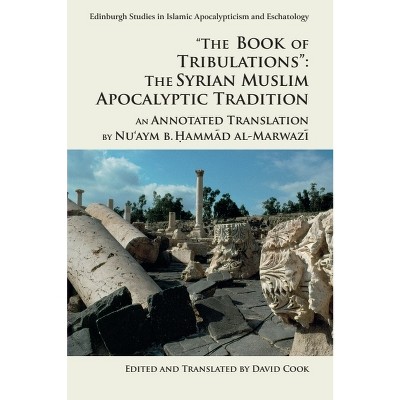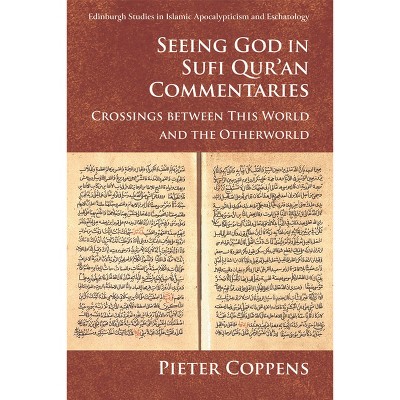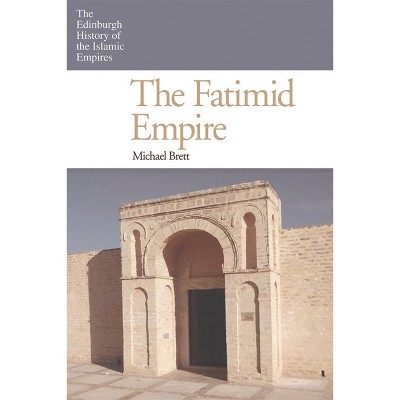An Apocalyptic History of the Early Fatimid Empire - (Edinburgh Studies in Islamic Apocalypticism and Eschatology) by Jamel Velji (Paperback)

About this item
Highlights
- How can religion transform a society?
- About the Author: Jamel Velji is an Assistant Professor of Religious Studies at Claremont McKenna College in Claremont, California.
- 184 Pages
- History, Europe
- Series Name: Edinburgh Studies in Islamic Apocalypticism and Eschatology
Description
About the Book
This book investigates the ways in which a medieval Islamic movement harnessed Quranic visions of utopia to construct one of the most brilliant and lasting empires in Islamic history (979-1171).
Book Synopsis
How can religion transform a society? This book investigates the ways in which a medieval Islamic movement harnessed Quranic visions of utopia to construct one of the most brilliant and lasting empires in Islamic history (979-1171). The Fatimids' apocalyptic vision of their central place in an imminent utopia played a critical role in transfiguring the intellectual and political terrains of North Africa in the early tenth century. Yet the realities that they faced on the ground often challenged their status as the custodians of a pristine Islam at the end of time.
Through a detailed examination of some of the structural features of the Fatimid revolution, as well as early works of ta'wil, or symbolic interpretation, Jamel Velji illustrates how the Fatimids conceived of their mission as one that would bring about an imminent utopia. He then examines how the Fatimids reinterpreted their place in history when the expected end never materialised. The book ends with an extensive discussion of another apocalyptic event linked to a Fatimid lineage: the Nizari Ismaili declaration of the end of time on August 8, 1164.
From the Back Cover
Explores the role of apocalyptic symbolism in the creation and development of the Fatimid Empire How can religion transform a society? This book investigates the ways in which a medieval Islamic movement harnessed Qur'anic visions of utopia to construct one of the most brilliant empires in Islamic history. The Fatimids' apocalyptic vision of their central place in an imminent utopia played a critical role in transfiguring the intellectual and political terrains of North Africa in the early tenth century. Yet the realities that they faced on the ground often challenged their status as the custodians of a pristine Islam at the end of time. As well as examining the organisational features of the Fatimid revolution, Jamel Velji shows how the Fatimids viewed their mission as bringing about an imminent utopia. He then looks at how they re-examined their place in history when the expected end failed to materialise. Key Features - Introduces selected themes, texts and theoretical problems in early Fatimid history and thought to those unfamiliar with Islam or the Shia tradition - Illustrates specific interpretive mechanisms used by the Fatimids and Nizaris to argue for their right to rule - Employs theoretical tools from religious studies and rhetorical analysis to examine data from the Fatimid tradition, showing how Islam can contribute to broader discussions in the history of religions - Looks at how various components of the apocalyptic myth - especially the utopia that it promised - evolved in response to shifting historical circumstances Jamel Velji is an Assistant Professor of Religious Studies at Claremont McKenna College in Claremont, California. Cover image: a leaf in Kufic script from the celebrated 'Blue Qur'an', thought to have been created in Tunisia during the 9th-10th century (c) akg-images/Pictures From History Cover design: [EUP logo] edinburghuniversitypress.com ISBN 978-0-7486-9088-6 BarcodeReview Quotes
"An Apocalyptic History of the Early Fatimid Empire makes a compelling case for the prominence of messianic hopes and eschatological expectations in the rise and early rule of the Fatimids." -- Mehdy Shaddel, Reading Religion (American Academy of Religion)
"[Velji's] analysis is insightful and provocative. In demonstrating the ways in which Fatimid and Nizari texts collapse and elide various temporal registers, he makes these complicated and perplexing texts sing for his readers ... [Velji's] approach will provoke incisive and important questions about apocalyptic phenomena that can easily appear as bizarre and unsettling. Readers will benefit from the glimpse that An Apocalyptic History of the Early Fatimid Empire offers of both the seething creativity and logical elegance of these Fatimid sources." -- William E. B. Sherman, University of North Carolina at Charlotte, Religion
About the Author
Jamel Velji is an Assistant Professor of Religious Studies at Claremont McKenna College in Claremont, California.Shipping details
Return details
Trending Non-Fiction











